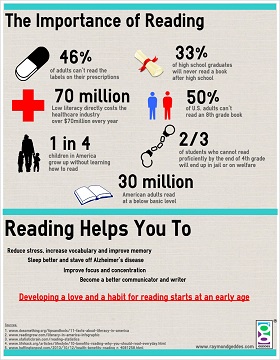September 8th has been declared international literacy day by the UN. Despite the fact that this problem often does not get the attention it deserves, especially in developing countries, the issue of functional illiteracy is a very pressing one for societies of practically any nation. What does this phenomenon represent, and how can we fight it? Who would benefit from creating solutions? Tatyana Zhukova, president of the Russian School Libraries Association, an expert in the State Duma Committee on Family, Women and Children Affairs, comments on the situation.
September 8th has been declared international literacy day by the UN. Despite the fact that this problem often does not get the attention it deserves, especially in developing countries, the issue of functional illiteracy is a very pressing one for societies of practically any nation. What does this phenomenon represent, and how can we fight it? Who would benefit from creating solutions? Tatyana Zhukova, president of the Russian School Libraries Association, an expert in the State Duma Committee on Family, Women and Children Affairs, comments on the situation.
Often while searching for work, many young professionals with college degrees show up for interviews, although many of them suffer from functional illiteracy. They do not grasp concepts or suggest new projects. This is a problem that must be combated starting at the primary school level.
The definition of functional illiteracy figures into one of our articles: despite technological progress, one cannot deny the truth that the prerequisite for accessing information in electronic form will always be the ability to read. Research conducted in different countries shows that those who can read differ from “non-readers” in terms of intellectual development. They are the first to be able to think in terms of the problem, grasp main ideas and catch unlikely connections between events; they evaluate the situation more reasonably, find the correct solutions more quickly, have larger memories and more active imaginations, and express themselves better. They phrase thoughts more exactly, write better, enter into communication more easily and communicate pleasantly; they are more critical and independent when exercising judgment and in general, and display the qualities of generally developed and socially valuable people.
Research is regularly conducted abroad on levels of functional illiteracy. Russian nine-year-olds show impressive results; Russia ranks among the top countries, along with Singapore and others, in education. However, Russian fifteen-year-old high-school students, at an age when they should already be preparing to enter society, have been showing some of the lowest results in Europe for the last fourteen years.
During research on functional illiteracy, subjects are tested on understanding of a text and assigned one of five levels of mastery of textual content. Russian children have only reached the second level of understanding, whereas children from Shanghai, for example, have reached the fifth. Australia, South Korea and Finland have constantly placed among the top five. Russia will therefore regularly fall victim to the so-called “human factor” in accidents and collisions, because the infamous human factor in that case means the inability to correctly read and understand instructions on how to use equipment, machines or instruments. This is why functional illiteracy in the 21st century is called a risk to civilization.
Amounts of information are increasing exponentially. According to specialists from South Korea, every 72 hours the volume of information in the world doubles. Our task is not only to read information, but to quickly let it sink in and put it into practice. The term “generation Z” refers to the new generation of “multi-tasking” children. Unfortunately, many of them browse huge quantities of information while failing to internalize any of it. This is the potential for functional illiteracy.
An even greater global risk for Russian school children is the manipulation of perception in the context of information wars. School-age children’s inability to critically approach given information is a real problem.
The cognitive aspect of teaching is important for Russia. If a child has not learned to understand what he reads by the age of 12, he will become functionally illiterate and an ineffective part of the population. Unfortunately, Russian research on the topic is being conducted behind closed doors. In many developed countries, the opposite is taking place: research is conducted openly. For example, a few years ago researchers in Finland discovered that 20% of the educated population was functionally illiterate, and that this poses a threat to the country’s development. Russia has experts who closely study this problem. It seems to me that this should be designated one of Russia’s most important resources for strategic development.
We’ve launched a project known as “Literate Mom – Literate Nation,” which includes organizing parent and class meetings. Without parent involvement, developing a child’s reading skills is much harder and practically impossible. Parents don’t have a lot of free time today to read and set a good example for their children in doing so.
We’ve also begun a project for mothers called “Open your Heart.” It involves families reading small soviet stories with prior suggestions as to how to discuss with children the meaning of the words “conscience,” “kindness,” etc. Children are starting to read differently and therefore learn differently as well. A child needs to understand the content and idea of a text rather than learn it by heart, because memorized material will not remain in the child’s subconscious and become part of his educational background.
Every school should allow children the use of a library. This necessity is given special attention in many countries of the world. Russian school libraries are now suffering from two problems: lack of funds and lack of librarians. Many school and college graduates with specific degrees often cannot find work in their field.
Library funds in Russia are currently in a critical state. Many libraries acquire no new books for years at a time. Parents are unwilling for many reasons to donate monies to support and update school libraries or even do not consider instilling a love of reading in their children a priority for successfully raising them. We miss the vital age of 12 years old, after which one can say “read this,” but children have already lost interest.
In Russian schools, teachers emphasize the technical aspect of reading only. Parents ask one another, “your child will start school soon – can he read?” By this they mean only the process of assigning sounds to letters. They do not pay the necessary attention to whether or not the child has understood what she has read.
A wonderful program has now been initiated by the president of Russia: “The National Strategy in the Interest of Children”. This is the first national project integrating all departments and organizations focusing on the topic of childhood. Unfortunately, the Minister of Education and Science of the Russian Federation did not include school libraries in the program. Our task for the time being is to become integrated into this national program, in order to bring parents’ and teachers’ attention to the issue of school libraries and their workers. Business representatives could finance programs for creative reading. I believe the movement we’ve begun – “Young Russia Reads”, – could unite the problem of teaching conscious and literate reading and the issue of Internet safety. It doesn’t matter whether a child is reading an electronic word or a word on paper. The cognitive aspect of this activity remains the same. Federal Law No. 436 on information harmful to children’s health and development allocates much attention to safety and very little to development.
Examining the given problem from a purely economic point of view is insufficient; we must approach it from all angles. We cannot “fix” the economy without creative, constructive future Russian reformers. And growth is needed, while developing the depth and quality of thinking. The best tool here is freely accessible quality literature.






